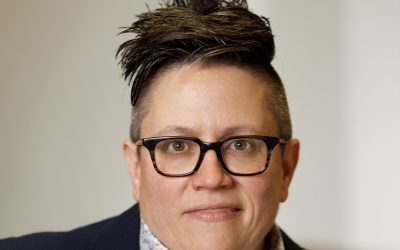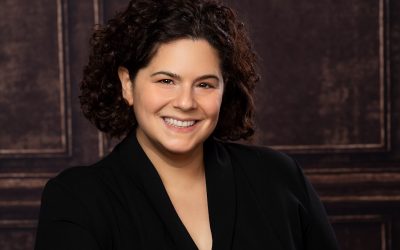The revitalized program, now in its second year, continues to grow and flourish
January 2024 – For the fall 2022 semester, Drew University reintroduced its interdisciplinary Jewish Studies program and welcomed Dr. Eli Rosenblatt as the Wallerstein Assistant Professor of Jewish Studies and Director of Jewish Studies.
Enlarge

Rosenblatt’s appointment filled a critical gap in the academic offering for both the College of Liberal Arts (CLA) and Drew Theological School.
The Wallerstein professorship in Jewish Studies was founded in 1990 by Madeleine and Julian Wallerstein to promote the University-wide study of Jewish wisdom, life, and history at Drew in ways that are broadly ecumenical, contribute to the training of Methodist and other Protestant seminarians, and to increase interreligious understanding and appreciation of Jewish contributions to world cultures.
“The important American Jewish philosopher and theologian Will Herberg taught at Drew after World War II,” said Rosenblatt. “My appointment moves the program into dialogue with the current generation of Jewish Studies programs, which strive to teach Jewish history, culture, and texts with interdisciplinary and historical breadth.”
Drew’s Jewish Studies program is a cross-campus formation with the intention to draw students from the CLA, the Caspersen School of Graduate Studies, and the Theological School to encounter and dialogue with each other. “I want the Jewish Studies program to be a home for students who want to read and write; to act on their ethical commitments; analyze and study art, music, theater; visit museums; and to give voice to their own ideas in community with others,” said Rosenblatt.
The unique interdisciplinary program provides course offerings for all students, full support to PhD students in the Theological School, extra-curricular programming for the local community, as well as the minor in Jewish Studies. Since arriving at Drew, Rosenblatt has offered three distinct courses, an introductory course open to all Drew students titled Judaism: Tradition and Community, a CLA course titled Jews Across the Americas, as well as a course on the history of antisemitism for advanced Caspersen and Theological School students.
Enlarge

“The minor in Jewish Studies at Drew is first and foremost for students who like to read and write and think creatively!” said Rosenblatt. “Jewish culture is a great way to look at bigger questions and ideas. How does religion and political action intersect? Should an understanding of my family history guide my future choices? Can the study of literature help me understand how gender, race, and class interact? How do oppressed communities persist and even thrive in the face of adversity? Through the rich specificity of Jewish culture, the program seeks to give the Drew undergrad new ways of looking at issues and questions of universal concern—the types of questions which have shifting and complex answers.”
The program seeks to be active and engaged with the community by inviting guest lecturers, hosting conferences, publishing, and implementing travel courses. Rosenblatt plans to continue the existing off-site learning in New York City to Hasidic Williamsburg and the Center for Jewish History.
The Jewish Studies program is sponsoring two special and relevant lectures this semester; The Demons in the Details, or What Are All Those Demons Doing in the Talmud? with Dr. Sara Ronis, associate professor of theology at St. Mary’s University in Texas, and A Conversation with Alexandra Corwin, executive director of Ammud: Jews of Color Torah Academy.
In the spring 2023 semester, Rosenblatt was integral in bringing Michael Twitty, renowned culinary historian, public scholar, and author of Koshersoul and The Cooking Gene, to Drew’s campus for a full day of student-centered events.
Rosenblatt is a cultural historian, with a particular focus on the Jews of Eastern Europe and the Americas in the nineteenth and twentieth centuries. He earned his PhD in Jewish Studies from the University of California, Berkeley, which “embedded in me an interest in the nexus of religion, politics, literature, and language in modern Jewish culture,” he said.


